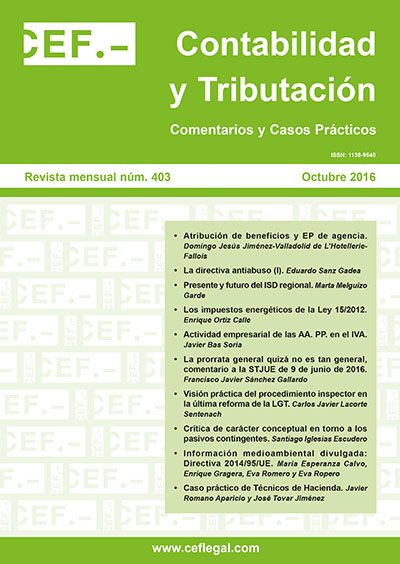Los impuestos energéticos de la Ley 15/2012: problemas comunitarios y constitucionales
DOI:
https://doi.org/10.51302/rcyt.2016.4741Palabras clave:
impuestos energéticos, Derecho Comunitario y ConstitucionalResumen
Junto a los impuestos tradicionales que gravan la renta y el consumo, el sector energético está sometido a una serie de impuestos especiales a los que han venido a sumarse los creados por la Ley 15/2012 cuya justificación, desde consideraciones de política legislativa, es más que dudosa. Esta acumulación asistemática de tributos sobre una misma realidad económica plantea graves problemas de Derecho Comunitario y Constitucional. Así, las «cargas especiales» que soportan la energía nuclear y algunas centrales hidroeléctricas pueden afectar a la libre competencia e infringir la normativa europea sobre ayudas de Estado. Además, si los impuestos creados por la Ley 15/2012 se acabaran trasladando vía precios a los consumidores de electricidad, habría que preguntarse por la posible aplicación de la Directiva 2008/118/CE, que en su artículo 1 limita la facultad de los Estados miembros de crear impuestos sobre consumos específicos que carezcan de finalidad extrafiscal. Un análisis constitucional requiere encontrar una justificación para unos tributos que, por una parte, gravan a un círculo muy restringido de contribuyentes que ya satisfacen el Impuesto sobre Sociedades por la capacidad económica que manifiestan en la obtención de renta, lo que puede contravenir los principios de igualdad y generalidad de la imposición. Esos mismos tributos destinan su recaudación, por otro lado, no a la financiación general de los gastos públicos sino a la corrección del déficit tarifario, afectando al poder presupuestario del Parlamento. Finalmente, la entrada en vigor de la Ley 15/2012 incide sobre el conjunto de la tributación energética autonómica, por lo que urge aclarar cómo queda el espacio fiscal propio de las comunidades autónomas en este ámbito.















